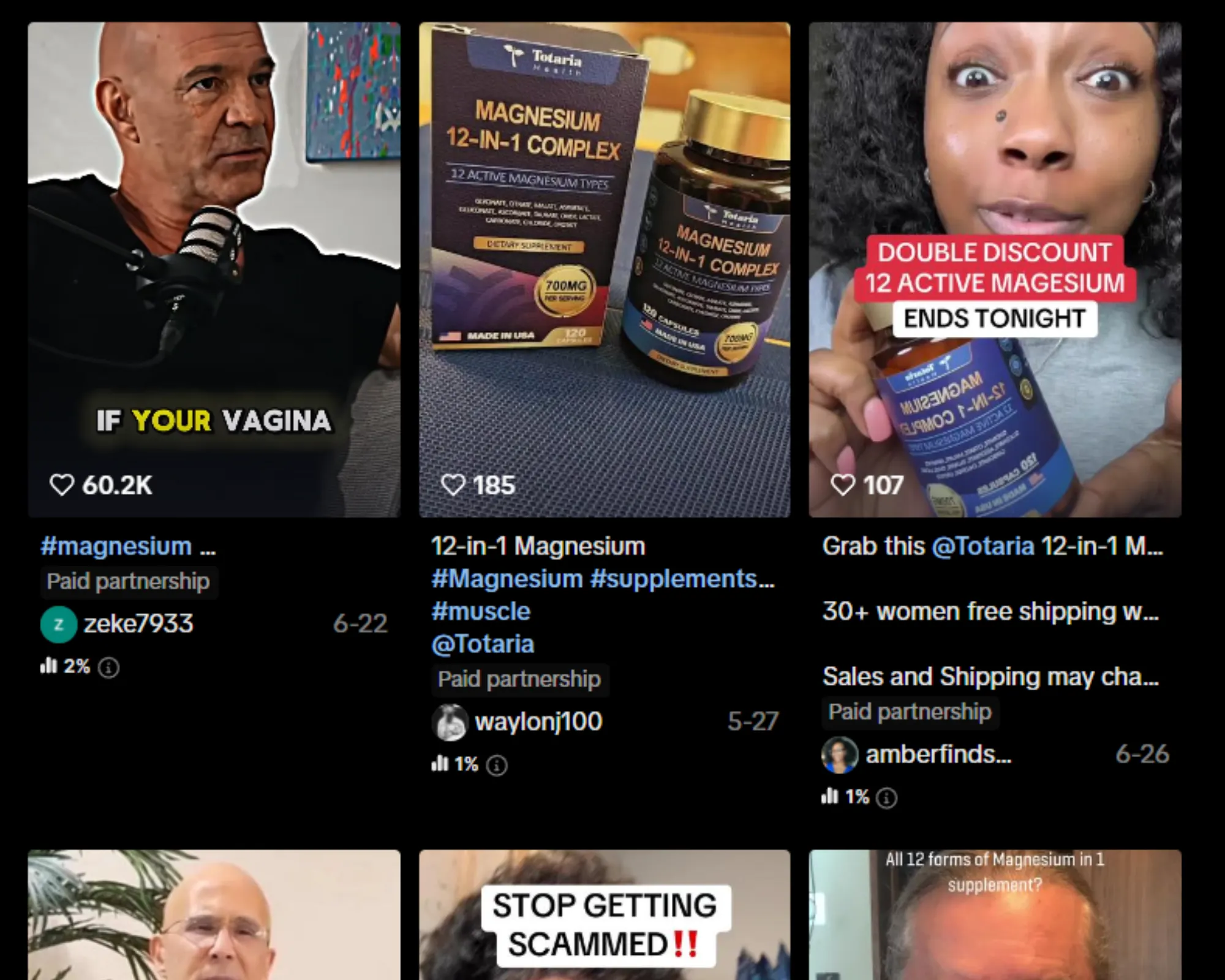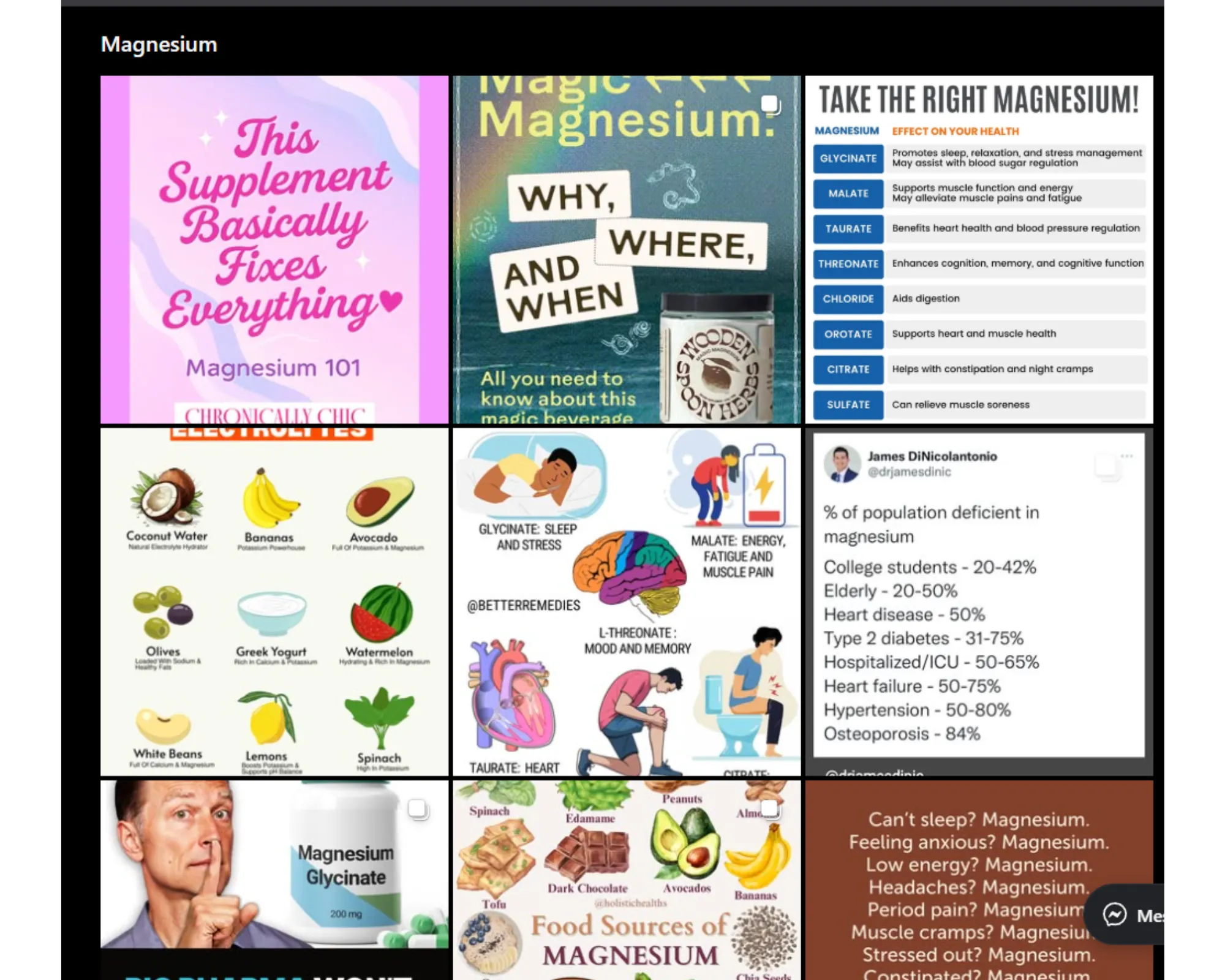In brief
- AI avatars and influencers are pushing high-dose magnesium with misleading health claims.
- Doctors warn of real health risks, especially for vulnerable groups.
- Experts urge consulting professionals, and eating healthy food rather than taking more pills.
Magnesium is having a moment. Touted as the latest cure-all by wellness influencers—and their increasingly realistic AI clones—the mineral is flooding social media feeds with promises of better sleep, less stress, and longer lives. But medical experts say the trend is full of misinformation, and potentially dangerous.
Promoted by humans and AI-generated avatars across TikTok, Instagram, and YouTube, magnesium supplements are being sold as catch-all cures for anxiety, insomnia, and weight gain. Some supplements pack up to 700mg per dose—nearly twice the recommended maximum—and that has doctors raising red flags.
“AI ‘physicians’ are giving testimonials that are direct, black and white: ‘If you have this problem, this is how it works.’ It’s convincing if you don’t realize it’s AI,” Dr. Steven Chen, associate dean for clinical affairs at the USC School of Pharmacy, told Decrypt. “What worries me about these quick snippets is that they don’t mention the risks.”
Chen said that while magnesium does have legitimate uses—such as managing bowel regularity and easing muscle tension—those benefits are being cherry-picked and exaggerated.
As AI-generated images become more advanced, experts say the line between fact and fiction is becoming harder to spot.
Most adults need no more than 400mg of magnesium per day, and that’s easily handled by foods such as peanut butter, cashews, chia seeds, chicken breast, and salmon. But viral supplements are being sold like performance enhancers—fast, easy, and algorithm-approved, with some supplements selling pills offering more than twice that level.
While magnesium itself isn’t illegal or regulated like a drug, the way it’s being sold—through algorithm-driven promotion and generative AI testimonials—has transformed it into a profit-churning health product marketed with little oversight.

Too much magnesium can be especially harmful, especially for people with heart, digestive, or kidney problems.
Common side effects of magnesium supplements include diarrhea, nausea, stomach cramps, flushing, headaches, and muscle weakness. However, in people with kidney problems–who can’t excrete excess magnesium efficiently—the mineral can build up to dangerous levels, causing low blood pressure, trouble urinating, confusion, difficulty breathing, an irregular or slow heartbeat, and even cardiac arrest.
Aiming to give their ads more legitimacy, some use AI to make medical experts appear to make positive claims about magnesium supplements, a practice that Chen called “dangerous and unethical.”
“Everyone wants simple and quick,” he said. “But when it comes to serious health needs, there’s no quick fix for good sleep, exercise, and good nutrition.”

The search for a longevity quick fix has led to a boom in the supplement industry. In 2024, the dietary supplement market was worth $189 billion. According to market research firm Precedence Research, by 2035, that number is expected to reach $402 billion.
When asked about advertisements featuring AI-generated medical testimonials and questionable health claims, the social media platforms offered limited explanations of their policies. A YouTube spokesperson pointed to its medical misinformation guidelines, which prohibit content that contradicts local health authority guidance, such as promoting harmful alternative treatments or discouraging professional medical care.
A representative for Meta also declined to comment directly on the ads, but pointed to their advertising policies, which prohibit deceptive or misleading health claims, promotion of unsafe supplements, exaggerated health-related promises, and advertisements featuring negative self-perception tactics or unauthorized uses of medical professionals’ likenesses.
TikTok did not respond to Decrypt’s request for comment.
“People love these platforms for freedom of speech and the ability to say whatever they want,” Chen said. “But we need a commitment to patient safety, making sure people don’t pursue something that’s not only unhelpful, but might cause them to ignore a serious condition. If they delay seeking help, it could be too late.”
According to Dr. Zhaoping Li, director of the UCLA Center for Human Nutrition, while magnesium is now commonly promoted for sleep and muscle support, its broader use stems from a more specific medical application.
“For women with preeclampsia, it was used to relax uterine muscles during contractions and prevent premature birth,” Li told Decrypt. “From there, people began using it more broadly for muscle relaxation. While not extensively studied, small studies suggest benefits for restless leg syndrome and for relaxing muscles before bed.”
Magnesium deficiency is common in people with poor diets or chronic alcohol use, Li explained, which is why it’s often replenished in clinical settings.
“If you came to the emergency room, they would have given you key nutrients—magnesium is one of them,” she said. “Based on that background, people now more freely recommend it for various health benefits, but the real benefit depends on what you use it for.”
Chen and Li both said that certain forms of magnesium are better absorbed and may be useful in specific cases. But products labeled as “complexes” with a dozen types are largely marketing.
“If we really were doing it for everyone’s benefit, I would recommend taking more natural food with high magnesium,” Li said. “The benefit is much, much more than taking a whole bunch of pills.”
Li argues that the real promise of AI in health lies not in marketing supplements, but in understanding food.
“If we really want to use AI, we need to study food altogether,” she said. “Not isolate one mineral and throw it into a capsule.”
Generally Intelligent Newsletter
A weekly AI journey narrated by Gen, a generative AI model.







